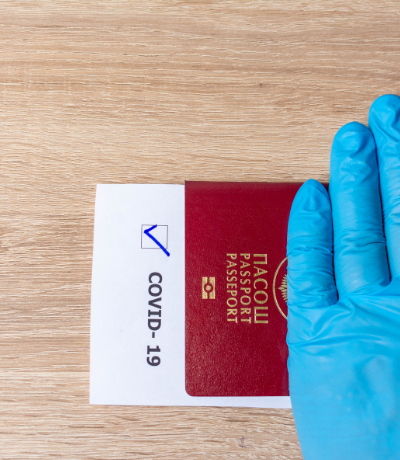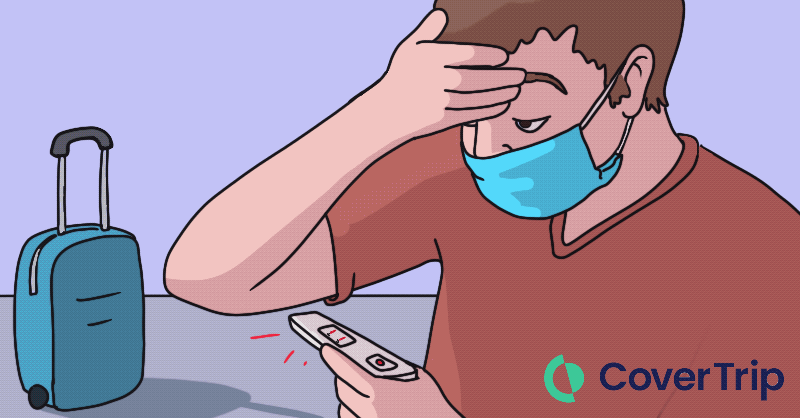What if you get COVID while traveling?
7 January 2022

We’ve all gotten used to an endless array of hygienic measures, mask mandates, pre-travel testing, and vaccinations to reduce the risk of contracting or spreading COVID-19. The new and rapidly spreading variant has caused a new round of global uncertainty and travel restrictions.
In the latest shakeup of travel news, two countries (England and Israel) have ditched the pre-arrival tests for incoming travelers. As the world continues to navigate the COVID-19 pandemic and works to decide what endemic means, the question-of-the-week on travelers’ minds is what to do if they get COVID while traveling.
If you’re ready to travel and concerned about testing positive or getting sick with COVID-19 while away from home, here are the answers to your top questions.
Q: What can I do to be prepared?
Expecting the unexpected is part of travel planning and it’s even more essential now. Here are five critical steps to complete to be prepared before you leave:
- Pack your own COVID-19 test kits like Abbott BinaxNOW. You’ll need one for each location where you’ll be required to show a negative result. You may want to have extra if you want to be sure you’re COVID-free as you travel or just in case you test positive and need to re-test later.
- Download the COVID testing app to your smartphone before you go. See your test kit to know which one to use.
- Carry a small power bank for your smartphone. You’ll be surprised how many times you need to pull up documents as you travel and running out of battery is not an option. See the best recommendations for portable power banks.
- Download vital documents like passenger locator forms and negative test results directly to your phone so you can find them quickly for people asking to see them.
- Know your quarantine requirements and options before you leave. Isolation requirements can last anywhere from one to three weeks depending on your location. Consider things like access to refrigerators, nearby restaurants, and delivery options when booking your stay.
Q: What are my medical treatment options?
Depending on your health insurance and where you’re traveling, you’ll want to know how you can get medical treatment on your trip. In addition, not all health care systems are equal and medical facilities in some places are already overwhelmed by patients.
- Research the current infection rate at your destination and learn where you can get treated.
- Know how to get to a healthcare provider if you need to seek treatment. Public transit should be avoided if you know you are ill with coronavirus.
- Ask if your health insurance will cover treatment where you’re traveling, and if not, purchase a travel insurance plan with adequate coverage.
- Learn about the quarantine laws at your destination before you go. Breaking these laws can lead to hefty fines and, in some places, imprisonment so you want to know before you go.
Q: What if I develop COVID symptoms?
If you, or a traveling companion, experience symptoms of the coronavirus, the first priority is getting tested. Information is power and the sooner you’re diagnosed, the quicker you can protect yourself and those around you. If someone in your travel group tests positive, where’s what to do:
- Make sure everyone in the group gets tested right away (this is where having your own tests comes in handy).
- Consider changing your flight arrangements. If you’re flying back to the US, for example, proof of a negative test taken one day prior is required before you can board the plane. If you test positive close to your return date, you may need to extend your trip by a week or more until you can get a negative test result.
- Arrange to extend your stay. You’ll need to isolate the travelers who test positive until they have recovered and can test negative. Many hotels will allow you to extend your stay and quarantine on premises. Some will move guests to government-mandated quarantine sites, which can vary from five-star accommodations to bare-bones barracks.
Contracting the virus may be stressful. Preparation and vigilance of the changing rules can help you manage last-minute logistics more easily.
The good news?
US domestic airfares are relatively cheap compared to the same period in previous years. International flights are also cheaper than normal. According to Scott’s Cheap Flights, now is the time to book summer travel because the airfare rates are cheap now.
Remember that airlines are still waiving change fees for all fares above basic economy so you can pencil in your summer travel plans now and stay flexible as your travel dates get closer. If there’s any silver lining to a global pandemic, this might be it.
Other interesting news
- Tulips, beer, and revelry – here are 10 state festivals that are worth traveling to according to the The Discoverer blog. Many mimic those in countries abroad, giving US travelers a reason to stay stateside.
- Need a way to find your wallet (besides asking your partner where it is)? Take a look at the new trackable smart wallets.
- Safest airline revealed – the safest airline for 2022 as revealed by AirlineRatings.com (including the list of the top 10 safest low-cost airlines).
- Short-haul flight bans – many European cities are connected by cheap flights but in an effort to reduce the region’s carbon output, governments are imposing bans on short flights where train routes are in place.
- Underwater driving – connecting the expressways of Suzhou, Wuxi, and Changzhou, the longest underwater highway tunnel is now open in China.
Damian Tysdal is the founder of CoverTrip, and is a licensed agent for travel insurance (MA 1883287). He believes travel insurance should be easier to understand, and started the first travel insurance blog in 2006.
